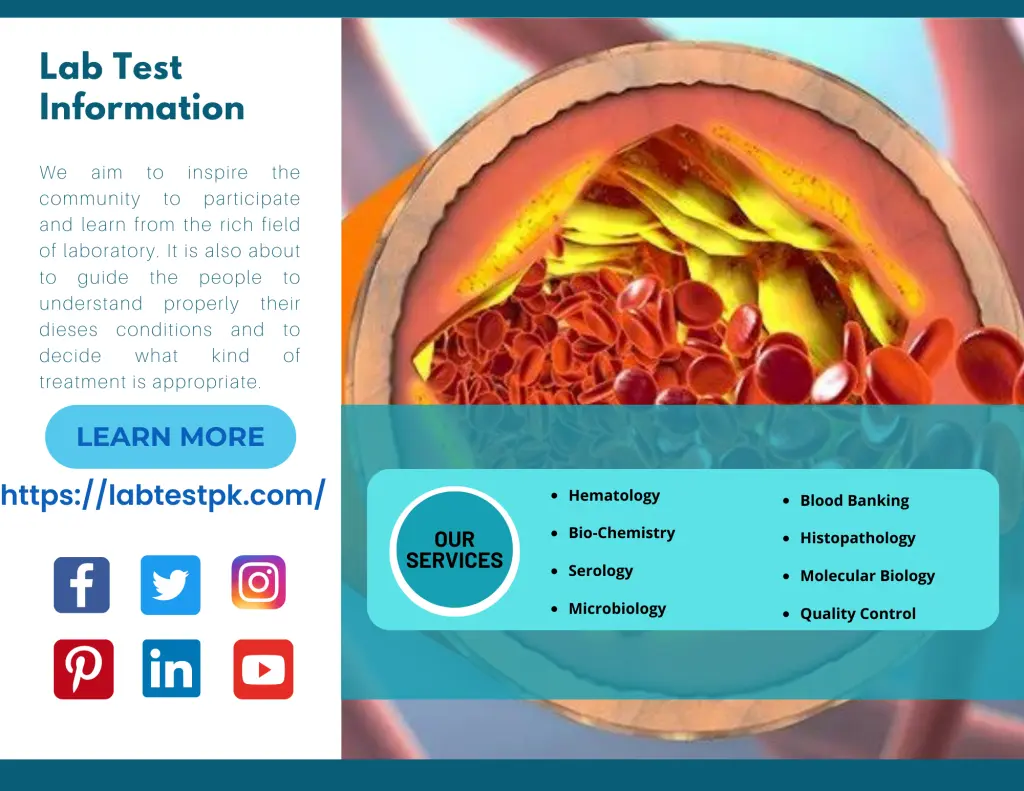Total Serum Cholesterol
Total Serum Cholesterol, Cholesterol is a type of fat and has the formula sterol. Cholesterol is present in the cells of the human body. Foods include meat, milk, eggs, and ghee. Cholesterol can also build up in the human body. Cholesterol helps in making many hormones in the human body. Also involved in making bile salts (liver secretions).
Total serum cholesterol is present in the human body under the following conditions:
- Esterified Cholesterol
- Non-Esterified Cholesterol
Regular monitoring of blood cholesterol levels is very helpful in preventing heart diseases and high blood pressure.
Normal Value:
Adults: 200 mg/dl
How The Test is Performed:
Chemical Reaction:
The cholesterol esterase enzyme breaks down cholesterol esters. Then the enzyme cholesterol oxidase (Cholesterol Oxidase) acts on all the cholesterol to form an oxide on hydrogen. It combines with amino antipyrine with oxidase enzyme on hydrogen to form a red-colored compound and with the help of this color, the amount of cholesterol can be determined.

Procedure:
Take 3 to 5ml blood in a gel Tube. Centrifuge the blood sample. After centrifugation, the serum, and used for further analysis and to find out the value of total cholesterol. The procedure is as follows:
| Blank | Standard | Test | |
| Test Sample | — | — | 0.01 ml |
| Standard | — | 0.01 ml | — |
| Distal Water | 0.01 ml | — | — |
| Reagent | 1 ml | 1 ml | 1 ml |
Mix well and incubate for 10 minutes at 20-25°C. And read on chemistry analyzer.


[…] Serum […]
[…] Cholesterol: The sum of different forms of cholesterol, including low-density lipoprotein cholesterol (LDL-C) and high-density lipoprotein cholesterol […]
[…] that help the immune system fight infections and transport proteins that carry substances like cholesterol and iron. Fibrinogen plays a key role in blood clotting, helping to form clots to stop bleeding […]
[…] good health? Enter the lipid panel, a diagnostic tool that provides valuable insights into your cholesterol […]
[…] Estrogen has a protective effect on the cardiovascular system, helping to lower LDL (bad) cholesterol and maintain healthy blood vessels. Lower estrogen levels are associated with an increased risk of […]
[…] Through their mother’s breast milk. […]
[…] such as triglycerides, LDL (low-density lipoprotein), HDL (high-density lipoprotein), and total cholesterol. LFTs measure chemicals, proteins, and enzymes that are produced or processed by the liver, […]
[…] High-density lipoprotein (HDL) cholesterol […]
[…] Panel: A blood chemistry panel assesses various blood markers, including glucose (blood sugar), cholesterol levels, liver function, kidney function, and electrolyte balance. Abnormal levels can indicate […]
[…] (Low-Density Lipoprotein): Known as “bad” cholesterol, it can contribute to plaque buildup in […]